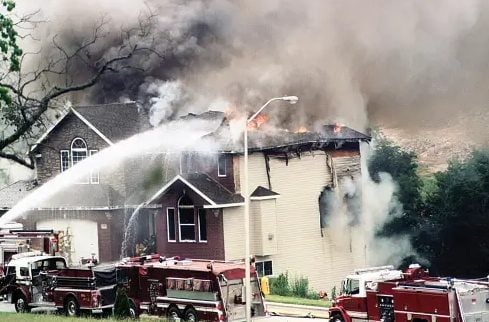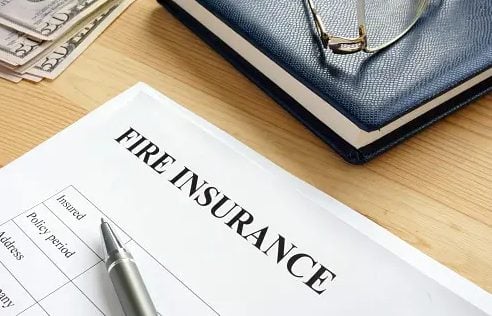BLOGS
Fire Insurance Claim For Your Home Made Easy
Fires are relatively common in the Philippines. The country’s climate, with its hot and dry periods, along with other factors such as urban congestion and inadequate fire safety measures, contribute to the occurrence of fires. Fires can happen in both urban and rural areas, affecting residential, commercial, and forested areas. More than 13, 029 fire occurrences were anticipated in 2022, according to a report by the National Fire Protection Association.
To mitigate the impact of fires, the Philippine government, together with various organizations, promotes fire prevention and safety measures. These efforts include public awareness campaigns, fire drills, the enforcement of building codes and regulations, and the establishment of fire stations and firefighting capabilities across the country.
However, in the unfortunate and unavoidable event of fire, there are still hope and light. If your property is insured, your insurance provider may provide coverage for damage or destruction caused by fire. To know more about the fire insurance claim, coverage, and other things related to it, keep on reading the article.
What is fire insurance claim in simple words?
A fire insurance claim refers to the process of seeking compensation from an insurance company for damages or losses resulting from a fire. Fire insurance is a type of property insurance that provides coverage for damage or destruction caused by fire. When a fire occurs and damages property covered by a fire insurance policy, the policyholder can file a fire insurance claim with their insurance company.

The General Fire Insurance Coverage
Fire insurance is often bundled as part of a comprehensive property insurance policy, for example, which may include coverage for other perils such as theft, vandalism, natural disasters, and more. It is essential for policyholders to carefully review the terms and conditions of their fire insurance policy to understand the coverage, exclusions, and any specific requirements for filing a claim. Here are the general provisions or limited coverage of common fire insurance policies:
- Dwelling or Structure
This covers the physical structure of the insured property, including the building, walls, roof, floors, and other fixed structures. It provides coverage for damages caused by fire, such as structural damage, smoke damage, and fire suppression efforts.
- Contents
This covers the contents or personal belongings within the insured property, such as furniture, appliances, electronics, clothing, and other valuable items. It provides compensation for damages or losses resulting from fire, including destruction or damage due to heat, smoke, or water used to extinguish the fire.
- Additional Living Expenses
In the event that the insured property becomes uninhabitable due to a fire, fire insurance may also cover additional living expenses. This can include the cost of temporary accommodation, meals, transportation, and other necessary expenses until the property is repaired or replaced.
- Firefighting Costs
Some fire insurance policies may include coverage for the cost of firefighting efforts, such as fees charged by the fire department for responding to the fire. This coverage can help mitigate additional expenses incurred during the firefighting process.
- Replacement Cost or Actual Cash Value
Fire insurance policies can provide coverage based on either replacement cost or actual cash value. Replacement cost coverage will reimburse the policyholder for the full cost of repairing or replacing damaged property without accounting for depreciation. The actual value of cash coverage takes depreciation into account, so the reimbursement amount may be lower.
It is also important to note that fire insurance policies typically have coverage limits and deductibles. The coverage limit is the maximum amount the insurance company will pay for fire-related damages, while the deductible is the amount of money that the policyholder or insurer must pay out of pocket before the insurance coverage applies.

What are the steps for fire insurance claim?
Homeowners are required by all policies to disclose losses as soon as is practical. Calling or emailing your agent will satisfy them. You need to be prepared before talking with an insurance provider over a significant claim. If you and the business disagree later on regarding who said what to whom and when, calls, emails, and letters might be important pieces of proof. every phone call, make notes to keep your dialogue organized.
Here are the general steps in filing the insurance claim documents:
-
Notification
The policyholder must promptly inform the insurance company about the fire incident. This typically involves contacting the insurance company’s claims department and providing details about the fire, including the date, time, and location.
-
Documentation
The policyholder needs to gather evidence and documentation to support the claim. This may include photographs or videos of the damaged property, a detailed list of the items or structures affected by the fire, and any relevant receipts, invoices, or appraisals.
-
Claim submission
The policyholder must complete the necessary claim form/s provided by the insurance company. These forms typically require detailed information about the insured property, the cause of the fire, and the extent of the damages.
Here are the particulars of the claims:
- For Building Claims
- A comprehensive estimate from an architect or civil engineer (obtained at the insured’s expense) to restore the building to its pre-loss condition. (No proposed enhancements may be included in the estimate, and age, depreciation, etc. must be properly taken into account.)
- Certified Building Permit copy
- Certified copy of the Property Declaration
- A duplicate of the building’s plan or a sketch created by the architect or engineer
- Agreement or lease if the insured is not the lot owner
- For Furniture and Equipment Claims
- A complete list of the items damaged or destroyed, together with their costs and dates of acquisition
- If any, invoices and receipts.
- For Goods and Merchandise (Stock in Trade) Claims
- Accounting records including books of accounts, financial statements, sales and purchase invoices, and other documents.
- Certified documents of the insured’s past two fiscal years’ income tax returns
- The most recent inventory of goods reported to the Bureau of Internal Revenue or another government agency before the loss
- A thorough list of the items damaged or destroyed, together with their cost and any potential salvage value in the event that the risk only suffered minor damage like water damage
-
Assessment
Once the claim is submitted, an insurance adjuster will be assigned to evaluate the damages and determine the coverage and compensation amount. The adjuster may visit the property, inspect the damage, and assess the value of the loss.
-
Compensation
If the claim is approved, the insurance company will provide compensation to the policyholder based on the terms and coverage limits of the insurance policy. The payment can be used to repair or rebuild damaged structures, replace lost belongings, or cover additional expenses incurred as a result of the fire.

In choosing the right insurance company, remember to consider factors such as coverage options, reputation, financial stability, customer reviews, and the specific needs of your property. It’s advisable to contact multiple insurance providers, compare their offerings, and seek professional advice if necessary.
Brittany Corporation: Fire Insured for you and your Family
The Brittany Corporation has the real estate and personal property insurance coverage that is mandated in the Philippines. The insurance policies cover, among other things, buildings and improvements, machinery and equipment, furniture, fixtures, and fittings against damage from fire and other natural calamities, machinery breakdown, third-party liability to the public, and construction projects, subject to the customary deductibles and exclusions. We have also secured insurance from a number of general contractors for its vertical projects.
We, here at Brittany, are committed to serve you not only with luxurious homes, but with safety and security. Check more of our properties and house and lot for sale.
Suggested Read: Economic Considerations Of Buying A Beach House
Suggested Read: Home Insurance For your Luxury Home
Suggested Read: Insurance Agent’s Edge In Real Estate
Suggested Read: Updating Your Investment Portfolio















